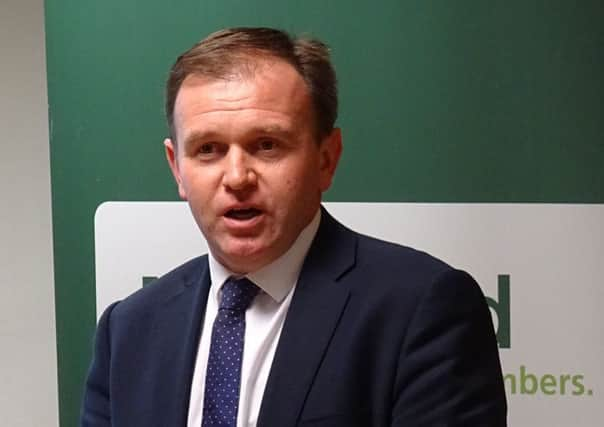Farming Minister told ‘government must lead farming to brighter future’


With prices for all produce under intense pressure and the strength of the pound against the euro fueling a growing import market, farmers cannot afford to invest in more advanced technology that would make the difference in the fields, the vice-president of the National Farmers’ Union Guy Smith said.
The Essex farmer spoke alongside Mr Eustice at the Northern Farming Conference today at Hexham Auction Mart and while the current situation is tough, the Minister said that government investment in technical research - with some of the leading projects happening in Yorkshire - was clearing the way for a brighter future.
Advertisement
Hide AdAdvertisement
Hide AdExplaining just how bad the situation was for farmers, conference chairman Andrew Robinson said: “We are in relatively unprecedented times in the modern agricultural industry. In my lifetime as a farmer’s son and now as an accountant I have never experienced a time when the farmgate prices for all farm produce across the board have been under so much pressure.”
Lamb prices are at a four-year low, wheat prices had fallen to £113.50 per tonne on Tuesday night and the farm gate milk price has dropped from an average of 31 pence per litre (ppl) to between 15-20ppl in 18 months, he said, adding that the price for beef, at the very time of year that prices were expected to stabilise because of seasonal demand in the run up to Christmas, were being forced down by processors.
Mr Robinson added: “In my experience in agriculture, when one sector has been doing bad at least another sector is doing well, and it isn’t at the moment - these are unique times.
“We have to be positive, challenge each other and work together to help push this great industry of ours forward. One way we can do this is by unlocking the potential of our crops and livestock.”
Advertisement
Hide AdAdvertisement
Hide AdNFU official Mr Smith, whose brief includes climate change, said weather and global markets were the biggest challenges for farmers, and those who would be successful in the future will be the ones that best manage the volatility of both.
“The weather is getting more volatile,” Mr Smith said. “It does appear to me that we are moving from drought to flood, wind and storm quite quickly and that leads to challenges as we know. But the other thing is that this erratic weather does appear to be making our markets more erratic.
“Our message to government is to accept that if we are to face more volatile times as farmers, we will need leadership from government to help us overcome that and farming has to become more strategic in the way it encounters these problems.”
He said the industry was “on the brink of a technical revolution” that will help farmers farm more responsibly and efficiently however the key point for government, he said, was that “this will involve investment and if you don’t have enough profit in the food chain for agriculture then farmers will not be able to invest in these technologies at a time when they very much need to do so”.
Advertisement
Hide AdAdvertisement
Hide AdMr Eustice said: “When you are in the eye of the storm as we are now, it is very difficult for the industry to lift its sights and look to the long term. Unlocking the potential of this industry is one of the priorities we have got as government.”
He said the Government was looking at different contractual models and how risk can be shared more equitably through the supply chain as part of its new 25-year food and farming plan, as well as opening new export markets and opening routes for new entrants, but he said technology was key to unlocking farming’s potential.
He said he was at Rothamsted Research Centre last week to launch a new agri-metrics centre - the first of centre of excellence the government was developing under its Agri-Tech Strategy - which will make better use of agricultural data so that a clear evidence-based approach can help shape agricultural policy.
He said that as part of that strategy the government was looking at several other centres of excellence including covering livestock, cereals and robotics.
Advertisement
Hide AdAdvertisement
Hide AdA £70million Catalyst Fund for individuals projects was also seeing a project in York looking at improving grain quality; scientists based in Castleford were exploring how spider’s venom can be used as a new pesticide product, and sheep genetics work in Bradford aimed to improve the quality and profitability of lamb.
He said he was also keen to see GM products, where they can be proved scientifically safe, come forward.
“These new technologies are exciting and could lead to some quite rapid breakthroughs when it comes to tackling some of the issues we have got around crop protection and disease management,” the Minister said.
He said he hoped genetic research would lead to crops and livestock being cultivated that would have protection against diseases, including, potentially, against bovine TB.
Advertisement
Hide AdAdvertisement
Hide Ad“My message today is that there is a lot to be encouraged about for the future of this industry, there’s lots of really exciting things going on in terms of technology and I think that will add to our productivity and competitiveness and help us address some of these challenges. Although we are in a very difficult position at the moment with commodity prices I think we can look forward to a bright future.”